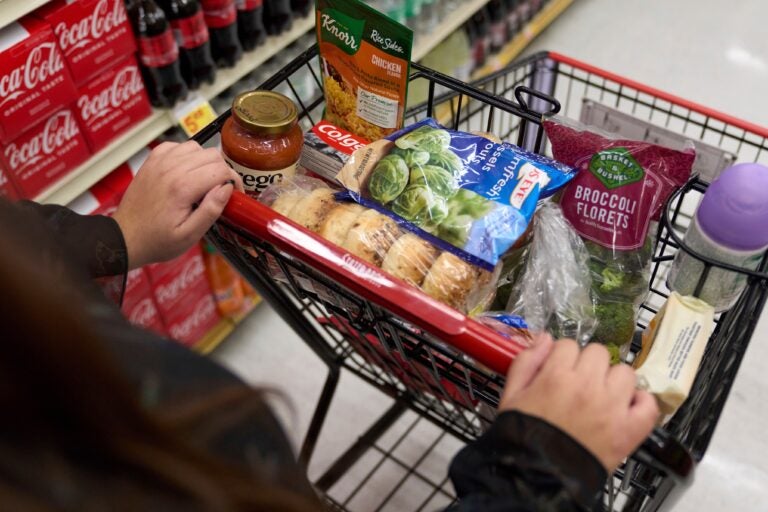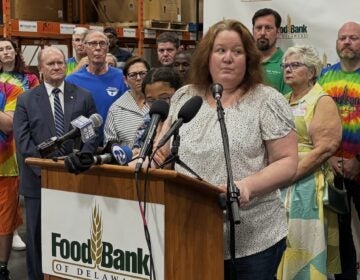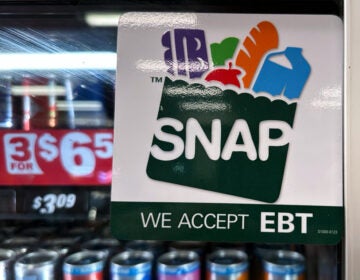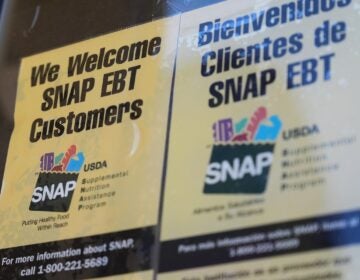New work requirements for SNAP recipients take effect
People who receive food stamps have to work 20 hours a week, or prove they have a medical or caretaker exemption.

FILE - A recipient of SNAP benefits shops for groceries at a supermarket in 2023. (AP Photo/Allison Dinner, File)
From Philly and the Pa. suburbs to South Jersey and Delaware, what would you like WHYY News to cover? Let us know!
Chris Parks started using food stamps more than five years ago, when she left her job to care for her brother, who is a kidney transplant recipient and has an intellectual disability.
The Philadelphia resident said receiving food stamps through the Supplemental Nutrition Assistance Program, or SNAP, to help pay for groceries frees up her wallet for other expenses, such as medical bills.
“It really helps, especially now with prices fluctuating at the various markets. A lot of times, I’ll find that it’s even more challenging to find fresh, organic food at a reasonable price,” Parks said. “You shouldn’t have to feel that you have to compromise food in order to pay for other things.”
Parks said she was shocked to learn a couple weeks ago that she could be at risk of losing her SNAP benefits, because of new work requirements under the Trump administration’s One Big Beautiful Bill that takes effect on Labor Day.
Food stamp recipients must prove they work or volunteer at least 20 hours a week, leaving thousands of residents like Parks scrambling to submit documentation demonstrating they can’t work, because of a health condition or because they’re a caretaker.
“With this new requirement, which is quite complicated, we’re worried that many people may lose access to SNAP, not because they’re no longer eligible, but because they don’t get the correct piece of paper in and processed at the right time,” said Lydia Gottesfeld, an attorney at Community Legal Services of Philadelphia.
The physician for Parks, who also has diabetes and osteoarthritis, signed off on an exemption. However, thousands of people across the state must find work or risk losing their SNAP benefits.
As many as 144,000 Pennsylvania residents, and as many as 45,000 Philadelphians, could lose their food stamps, according to state officials.
The new work requirements, which were part of the federal budget bill passed by Congress and signed by President Donald Trump in July, apply to adults under 55 who don’t have children. In November, veterans and people between 55 and 64 must comply with the change.
“For recent retirees, the last thing you want to be hit with is, ‘If you want to sustain your SNAP benefits, you have to go back out into the workforce and work X amount of hours.’ I said, ‘Are you kidding me?’” Parks said. “There is a website that tells you if you are officially a SNAP recipient … you can go to museums for half price. I’m not worried about museum admission prices. I’m worried about keeping food in the house.”
SNAP recipients who work and earn more than $217.50 per week before taxes are exempt from the requirements. Everyone else must submit documentation proving they work or volunteer at least 20 hours a week or that they have a qualifying exemption. Anyone who doesn’t meet these requirements will only be eligible for SNAP benefits for three months, every three years.
SNAP eligibility has also been removed for some immigrants, including refugees.
Many residents are still unaware about the changes, and advocacy groups are urging SNAP recipients to look for a notice in the mail.
“We’re hearing a lot of surprise, and people trying to understand the rules that are coming, what paperwork they need to get in,” Gottesfeld said. “People are also frustrated because they have various caregiving duties, or they’re an older adult, and meeting this work requirement doesn’t make a lot of sense.”

Get daily updates from WHYY News!
WHYY is your source for fact-based, in-depth journalism and information. As a nonprofit organization, we rely on financial support from readers like you. Please give today.





